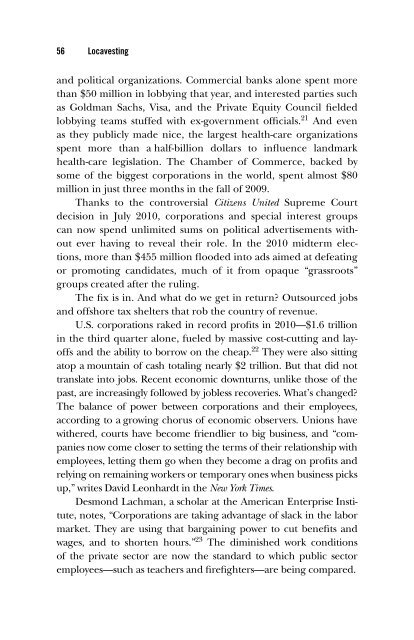3c hapter - Index of
3c hapter - Index of
3c hapter - Index of
You also want an ePaper? Increase the reach of your titles
YUMPU automatically turns print PDFs into web optimized ePapers that Google loves.
56 Locavesting<br />
and political organizations. Commercial banks alone spent more<br />
than $50 million in lobbying that year, and interested parties such<br />
as Goldman Sachs, Visa, and the Private Equity Council fi elded<br />
lobbying teams stuffed with ex- government <strong>of</strong>fi cials. 21 And even<br />
as they publicly made nice, the largest health- care organizations<br />
spent more than a half- billion dollars to infl uence landmark<br />
health- care legislation. The Chamber <strong>of</strong> Commerce, backed by<br />
some <strong>of</strong> the biggest corporations in the world, spent almost $80<br />
million in just three months in the fall <strong>of</strong> 2009.<br />
Thanks to the controversial Citizens United Supreme Court<br />
decision in July 2010, corporations and special interest groups<br />
can now spend unlimited sums on political advertisements without<br />
ever having to reveal their role. In the 2010 midterm elections,<br />
more than $455 million fl ooded into ads aimed at defeating<br />
or promoting candidates, much <strong>of</strong> it from opaque “grassroots”<br />
groups created after the ruling.<br />
The fi x is in. And what do we get in return? Outsourced jobs<br />
and <strong>of</strong>fshore tax shelters that rob the country <strong>of</strong> revenue.<br />
U.S. corporations raked in record pr<strong>of</strong>i ts in 2010—$1.6 trillion<br />
in the third quarter alone, fueled by massive cost- cutting and lay<strong>of</strong>fs<br />
and the ability to borrow on the cheap. 22 They were also sitting<br />
atop a mountain <strong>of</strong> cash totaling nearly $2 trillion. But that did not<br />
translate into jobs. Recent economic downturns, unlike those <strong>of</strong> the<br />
past, are increasingly followed by jobless recoveries. What’s changed?<br />
The balance <strong>of</strong> power between corporations and their employees,<br />
according to a growing chorus <strong>of</strong> economic observers. Unions have<br />
withered, courts have become friendlier to big business, and “companies<br />
now come closer to setting the terms <strong>of</strong> their relationship with<br />
employees, letting them go when they become a drag on pr<strong>of</strong>i ts and<br />
relying on remaining workers or temporary ones when business picks<br />
up,” writes David Leonhardt in the New York Times.<br />
Desmond Lachman, a scholar at the American Enterprise Institute,<br />
notes, “Corporations are taking advantage <strong>of</strong> slack in the labor<br />
market. They are using that bargaining power to cut benefi ts and<br />
wages, and to shorten hours.” 23 The diminished work conditions<br />
<strong>of</strong> the private sector are now the standard to which public sector<br />
employees—such as teachers and fi refi ghters—are being compared.
















